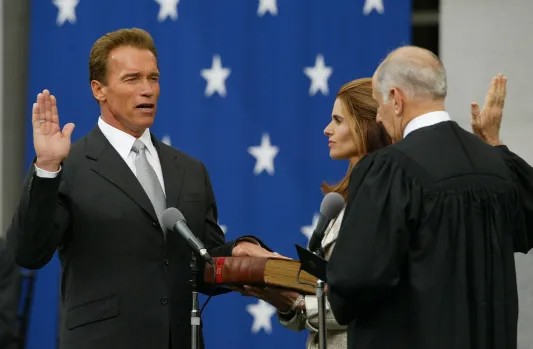A new political era begins
Arnold Schwarzenegger was inaugurated as governor of California in a ceremony that blended political gravity with Hollywood spectacle, marking a decisive shift in the state’s leadership and signalling voters’ desire for reform.
The former actor and businessman assumed office following the extraordinary recall election that removed Governor Gray Davis, becoming only the second governor in US history to enter office through such a process. His inauguration drew national and international attention, reflecting both his celebrity status and the breadth of the challenges he pledged to confront.
A recall that reshaped California’s political landscape
Schwarzenegger’s rise to the governorship followed months of political turmoil. The recall election, fuelled by widespread discontent over California’s fiscal crisis and its rolling energy problems, created a rare political opening. His candidacy, launched with characteristic confidence and directness, rapidly gained traction as he portrayed himself as an outsider capable of breaking through partisan deadlock.
The scale of voter engagement underscored the historic nature of the moment: millions of Californians cast ballots not only to remove an incumbent but to embrace an unconventional successor. Schwarzenegger’s victory represented a broad coalition of Republicans, independents and Democrats frustrated with the state’s direction.
Promising fiscal discipline and bipartisan cooperation
In his inaugural address, Schwarzenegger emphasised themes of unity, responsibility and renewal. He pledged to restore fiscal order, address the state’s soaring deficit and build a more accountable budgeting process. He also signalled that his administration would seek bipartisan solutions in a legislature dominated by Democrats, insisting that California’s problems required cooperation rather than confrontation.
His remarks reflected both optimism and realism, acknowledging the scale of the mess he inherited. He positioned himself as a governor ready to “roll up his sleeves,” borrowing language from his business background and appealing to voters who viewed him as a pragmatic figure rather than an ideologue.
Balancing celebrity and statecraft
Schwarzenegger’s inauguration highlighted the tension between his global fame and the seriousness of the office he assumed. While the event drew actors, political leaders and major media networks, he used the moment to underline that his future would be defined not by the silver screen but by policy decisions affecting 35 million Californians.
Political observers noted that his unique status offered both advantages and risks. His broad name recognition granted him leverage unavailable to traditional candidates, yet his lack of prior political experience meant he would face intense scrutiny as he transitioned from campaign promises to governing realities.
A mandate tested from day one
As he took office, Schwarzenegger confronted immediate challenges: a budget crisis, strained public services and divisions over taxation and spending. He signalled that difficult decisions lay ahead, but insisted that change would come through transparency and direct engagement with voters.
Whether his administration could deliver on ambitious reform remained uncertain, but his inaugural message was clear: California required a fresh approach, and he intended to bring one. For supporters, the day marked a rejuvenation of state leadership; for critics, it introduced a period of unpredictability. Yet all agreed the inauguration represented a turning point after months of political upheaval.
Newshub Editorial in North America – 2025-11-17



Recent Comments